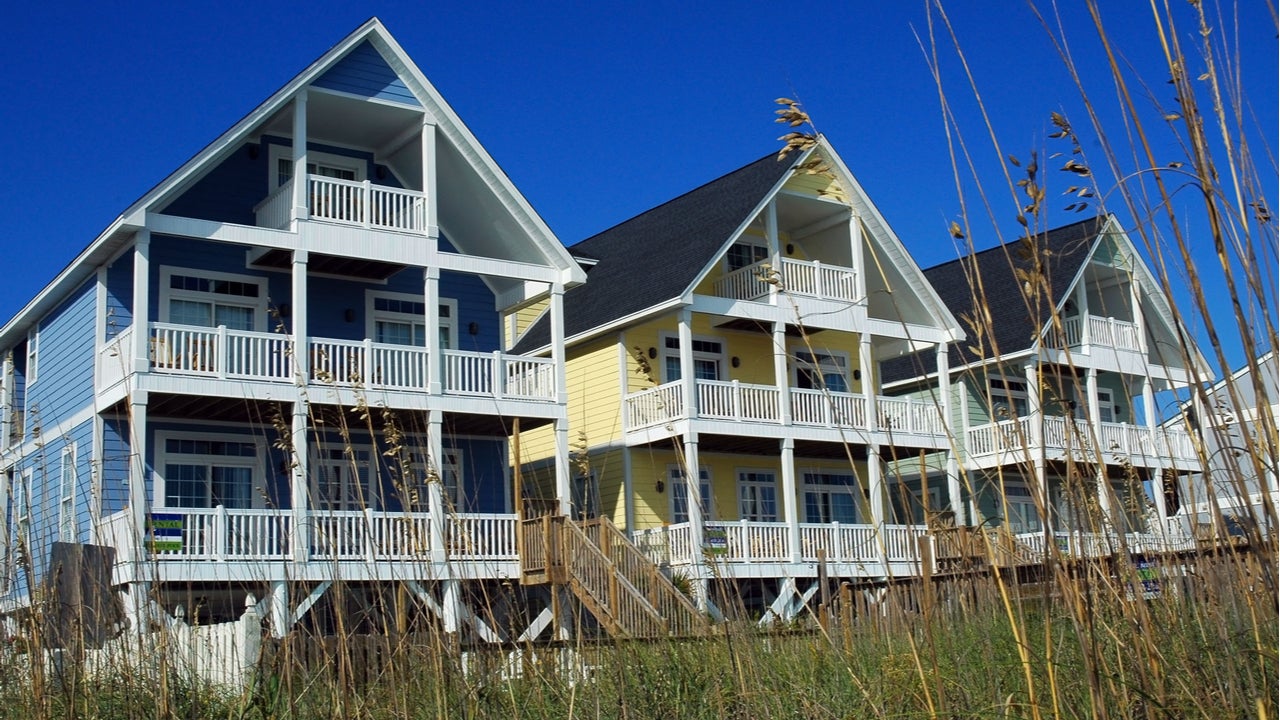Buying a house in Maryland: A how-to

If you’re thinking about buying a house in Maryland, get ready for some serious competition. Homes here are selling in just eight days, as of July 2022, according to data from Maryland Realtors. At the same time, rising mortgage rates might be making you question whether you should buy a house now or wait. However, if you have good credit and you’re planning to plant permanent roots here, buying is still a great decision. Use this guide to understand where to look for homes, how to qualify for down payment assistance and what you can do to make your dream of being a Maryland homeowner a reality.
How to buy a house in Maryland
Decide where to live in Maryland
From the rustic outdoor adventures of Allegany County to the big-city vibe of Baltimore, Maryland offers a place for just about every kind of lifestyle. As you look for the right place to call home, it’s important to factor in the total cost of living — not just the cost of a house. And be sure to think about long-term needs. Are you planning on starting a family? Be sure to consider schools in the area. What about healthcare? Compare options for hospitals and doctors. And what do property taxes look like in the places you’re considering? Tax rates vary by county in Maryland, so be sure to think about your annual financial obligations to the local government as a property owner.
Tips for buying a house in Maryland
Before you start comparing mortgage rates in Maryland, familiarize yourself with the state’s conforming loan limits. This will help you understand the cutoff point where a standard loan crosses into jumbo territory. If you’re looking to buy a home in the state’s higher-priced counties, like Montgomery, Prince George’s, Charles or Calvert, you get a bigger window, with the ability to borrow up to $970,800 before you need to look at jumbo loan rates.
Things to know about buying a house in Maryland
- Property taxes: Make sure to consider how much you’ll pay for property taxes, which can vary widely across the state. The city of Baltimore, for example, has the highest rate in Maryland at 2.248 percent, while Anne Arundel County’s rate is just 0.933 percent.
- Dual agency: Maryland permits a form of dual agency. While your individual real estate agent is not allowed to represent the seller, another agent at his or her brokerage is permitted to be the seller’s agent. If this potential conflict of interest does arise, both the buyer and the seller will need to sign the state’s consent form.
- Seller’s disclosure: Maryland law requires every seller of residential property to complete a disclosure form that outlines any known defects about the home. Read this form carefully to be aware of any issues, such as past roof damage or drainage problems.
- Closing costs: Closing costs in Maryland are high — the third-highest of any state, in fact. In 2021, the average closing costs in Maryland were $14,721, according to data from ClosingCorp. There is a bit of good news, though: A big chunk of that hefty bill comes from real estate transfer taxes and recordation taxes, which you’ll likely split with the seller 50/50.
- First-time buyers: If you’re a first-time homebuyer, there is even more good news about those closing costs. The state’s transfer tax, which is typically 0.5 percent of the sale price, is discounted to 0.25 percent for you, and the seller is responsible for that charge. You’ll still need to cover your portion of county taxes, though.
- Attorneys: Maryland buyers are not legally required to hire a real estate attorney — however, just because it’s not a must doesn’t mean you shouldn’t. It’s always smart to have a lawyer on your side to represent your interests in a big-money transaction like buying a house.
- Climate and weather considerations: Maryland is a coastal state with plenty of shoreline. While the Atlantic Ocean, Chesapeake Bay and Potomac River all make for beautiful backdrops, they also create heightened flooding risks. As you compare properties in the state, consider how much more you might need to pay for flood insurance — which is not typically part of standard homeowners insurance policies — to keep the home protected from water damage.
How much house can I afford in Maryland?
Understanding how much you can afford to spend on a house starts with understanding how much you earn. Most financial experts warn against spending more than 28 percent of your income on your housing expenses. So, if you earn $5,000 each month, your mortgage payment shouldn’t exceed $1,400. Your lender isn’t just going to look at the money coming in, though. Lenders also scrutinize the money you have going out to cover other debt, like student loans and credit cards. Use Bankrate’s New-House Calculator to crunch the numbers and set your home buying budget.
Saving for a down payment in Maryland
Saving up enough money for a down payment can feel like the most difficult part of becoming a homeowner. If you’re paying rent and covering all your other bills, you might wonder how you can manage to put any extra money aside for your home purchase. Well, assistance is available, and the state of Maryland might actually be able to provide part of the answer if you’re a first-time homebuyer. The Maryland Department of Housing and Community Development offers a range of options to help buyers who haven’t owned a home in the last three years (the common definition of “first-time” homebuyer).
In addition to statewide programs, be sure to investigate assistance available at the local level for low-income buyers. For example, the city of Annapolis has a Moderately Priced Dwelling Units law that mandates 15 percent of properties in certain developments will be priced at below-market rates.
Get preapproved for a mortgage
Now, it’s time to get preapproved for a mortgage. If your finances aren’t too complicated, this should be a fairly quick and painless process. A lender will take a preliminary look to give you an initial sign-off, indicating that you ought to be able to secure the financing you need. Presenting that document to a seller shows them that you are a serious, qualified buyer.
Find the right lender
Next up is finding a lender that will move past the “pre” status to formally approve your mortgage loan. This does not necessarily have to be the same institution that preapproved you. It’s important to compare a few other lenders to see who can offer you a combination of the lowest rates and the lowest fees. Make sure you ask each lender about how quickly they can close, too.
Find the best local real estate agent in Maryland
Having the right real estate agent on your team can make a world of difference when you’re buying a home. He or she will have a finger on the pulse of the local market and be able to point you to great listings and negotiate any back-and-forth details. As you interview agents, ask lots of questions to understand who is the best fit for your needs.
Are you buying a home while living in another state? Look for CRP, an acronym that stands for Certified Relocation Professional, next to an agent’s online profile to find someone who’s specifically trained in helping buyers deal with the added stress of searching for a home from far away.
House hunting and making an offer
As you start looking at homes, think about potential upsides and downsides to each property. For example, that waterfront condo might look amazing, but are you willing to deal without a parking spot? Or, that kitchen looks quite outdated — how much will a remodel cost you? Unless you have an unlimited budget, you’re probably going to have to make some compromises.
When you find a place that feels like a perfect fit, it’s time to put together an offer that will bring the seller to the bargaining table. Lean on your real estate agent for guidance on how fast you need to move and how much you should pay for the property. Almost half of Maryland homes sold for more than their asking price in July 2022, according to Redfin data, so you might need to prepare for a bigger price tag. However, it’s not necessarily all about money: There are other ways to make your offer stand out in a seller’s market.
Get a home inspection and appraisal
After you and the seller agree to contract terms, make sure you get a home inspection to verify that the property is in good condition. A professional home inspector will cost you a few hundred bucks, and while the expense is optional, it is well worth the money. If the inspector uncovers mold issues or termite damage, for example, you can try to leverage that knowledge for a lower price or even possibly walk away from the deal.
And if you’re financing the purchase, your mortgage lender will require an appraisal. This is their way of making sure that the house is worth at least the amount they’re lending you.
Final walk-through and closing on your new Maryland home
Your work isn’t quite finished. Make sure you schedule a final walk-through soon before your closing to make sure that the seller has removed all their belongings and the home is in the condition you’ve been promised. Then, it’s time to head to the closing table. You’ll need to have a certified check or a cashier’s check to cover all your charges. Sign your name on a lot of documents, and put the keys in your pocket: It’s time to unlock the door to this new chapter as a Maryland homeowner. Congratulations.
FAQs
-
The typical down payment in Maryland is $25,000. However, you may need more or less money, depending on how much the property costs and whether you are willing to pay private mortgage insurance (typically required if you put down less than 20 percent of the sale price). If you’re planning to apply for a conventional loan, you’ll likely need to put down at least 3 percent of the purchase price. On a $400,000 home, that’s $12,000. And don’t forget to budget for your portion of closing costs, which might actually be more than your down payment. In 2021, the closing costs on a $400,000 Maryland property were more than $14,700.
-
For conventional loans, you’ll need a minimum credit score of 620, although the best loan terms are reserved for borrowers with credit scores closer to 740. If you’re planning to apply for an FHA loan, you may be able to find lenders that will accept a credit score as low as 500. However, you’ll need to put down at least 10 percent of the purchase price.
-
The seller’s market is making this a fairly tough time to buy a home in Maryland. Limited inventory is fueling intense competition, and homes are selling very quickly. Maryland Realtors report that the typical property is only on the market for eight days before going to contract. However, there is some good news for buyers: Median home prices actually decreased by $11,000 between June and July. And there are a couple of great places to look for deals in the state, including Somerset and Garrett counties, where prices have decreased over the past year.
Why we ask for feedback Your feedback helps us improve our content and services. It takes less than a minute to complete.
Your responses are anonymous and will only be used for improving our website.





